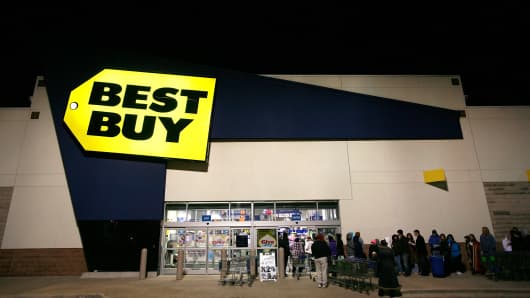A possible takeover could confirm the key expected drivers of the deals market, such as private equity and access to cheap buyout or merger financing. Meanwhile, a Best Buy buyout could also signal demand for blockbuster turnaround deals, amid a handful of beaten down former blue-chips like Research In Motion, Dell, and social media busts such as Groupon and Zynga.
Were no Best Buy deal to materialize after a takeover dance that started in early August, it could counter expectations that private-equity giants will play an outsized role in M&A markets and might underscore the impact of the fiscal cliff and weak signs of holiday season sales on C-Suite aggression.
After Best Buy founder and former chairman Richard Schulze proposed a $24-to-$26 a share takeover of the electronics retailer — Schulze has yet to make a formal offer — Best Buy's shares have fallen sharply on two disastrous earnings reports that show cash and earnings falling, amid online market competition and a weak market for PC-based products.
After delays to a prospective takeover offer, Schulze and a still suspect consortium of private-equity giants will have until Feb. 28 to submit a real bid that could give investors and the company's management something to think over. [So far, TheStreet has criticized Schulze for slow-playing a deal at the expense of ordinary investors].
A chronology of the Best Buy buyout drama shows why the retailer may be a leading indicator on overall M&A markets.
When Schulze first made his bid, analysts at Credit Suisse and Citigroup were skeptical he could find the debt financing or private-equity interest to support what initially appeared to be a $8.8 billion bid. According to Citigroup's initial August calculations, Schulze would need $5 billion in debt financing. Meanwhile, Credit Suisse analysts estimated a takeover would need a further $4 billion in private-equity support. Both pieces of a prospective Best Buy deal would near post-crisis highs in takeover financing.
In a 2013, Ernst & Young targets private equity as a bright spot for dealmakers, amid expectations of a flat to declining M&A market. "As corporates continue to be risk averse, PE firms are the ones to watch and are a potential bright spot in 2013 as the down economy provides a good time to invest," said Richard Jeanneret, the vice chair of E&Y's transaction advisory practice, in the Dec. 5 report.
In a follow up mid-December interview Jeanneret, who does not talk about specific companies or deals, said that M&A activity would likely also hinge on wider economic issues.
"I think there is a huge pent up demand and desire for deal making. If we can get some economic clarity, as well as some optimism that European Union has seen the worst then I think we can see a run in M&A," said Jeanneret, who maintained skepticism of such a scenario and cautioned a messy resolution to the fiscal cliff could put corporations back on the sidelines.
Best Buy isn't just a proxy for the animal spirits of the private-equity industry. The retailer is also exposed to the biggest trends in the technology and retail sectors, such as a consumer shift from PC's to mobile devices.
The prospect that Schulze, who is an over 20 percent holder of Best Buy's shares, decides to walk away from his takeover proposal might highlight the retailers struggles amid online competition from Amazon.com and discount retailer Wal-Mart Stores. It could also highlight a second order impact of weaker-than-expected demand for Microsoft's Windows 8 operating system, which is expected to breathe new life into the PC market amid sales declines and surging demand for mobile smartphone and tablet devices.
Since late November, retail consumer market research specialist NPD Group has reported underwhelming demand for Windows 8 and the mobile and desktop hardware that goes with Microsoft's newest software launch.
On Dec. 24, The New York Times cited NPD data as showing a drop in year-over-year demand for Microsoft software, signaling weakness across the PC-industry. Meanwhile, MasterCard Advisors SpendingPulse data shows a modest 0.7 percent rise in retail sales from Oct. 28 through Dec. 24, which reflects slowing growth from 2011 levels figures.
For Best Buy, the impact may be seen in fourth-quarter earnings. On Dec. 21, Morgan Stanley analyst David Gober cut the company's estimated gross margins and earnings per share citing weak consumer electronics retail demand and higher sales of Apple and Google-Android powered devices that are sold with promotional discounts.
As Schulze's Best Buy buyout drama nears a final act, investors should watch for a prospective deal as a key leading indicator of private-equity industry deals, in addition to the fast-changing retail and technology sectors.


